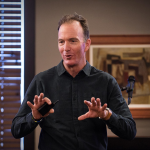Author: Douglas Kruger
Yet Mr Gates’ programme itself is not inherently evil and why you can do better without slides. Ouch!’Death by PowerPoint.’ That’s the commonly used term. Jim Nelson, a man who served as a translator between the American and Russian troops in Bosnia, tells a story about the Russians watching with bemused fascination as their unlikely […]
Ouch!’Death by PowerPoint.’ That’s the commonly used term. Yet Mr Gates’ programme itself is not inherently evil. Nor, for that matter, is the atomic bomb, poison gas or timeshare salespeople. It is simply how they are inflicted upon society that does it, and through no fault of its own, PowerPoint has been used to visit more pain on professional people, in a shorter space of time, than global recession and multilevel marketing combined.
Wikipedia estimates that PP is used around 350 times per second globally. In other words, blink, and nearly five hundred audiences have been exposed to it. As self-propagating systems go, PowerPoint looks at ISIS and sneers, ‘Amateurs!’
Brigadier-General Herbert McMaster, of the United States Army, famously banned the use of PowerPoint in briefings, saying that they negatively affected the decision-making process by misrepresenting ideas, essentially because the way in which ideas are arranged in slides ‘forces’ a certain kind of thinking and perception.
NASA did something similar.
One of PowerPoint’s great downfalls is that, no matter how well you use its myriad neat tricks, everyone else is using it too. And so even the most trained and effective PowerPoint devotees are merely marginally more developed sheep.
As a professional speaker, I’ve spotted a few distinct advantages to presenting without slides. In this article, I’d like to share them with you. In the next two to follow, I’ll propose some truly nifty replacements, because my goal is not just to rob you of a tool, but to replace it with much more effective ones.
I count seven distinct advantages to avoiding PowerPoint when you speak and present:
1. By not using it, you’ll stand out from the crowd
I’ve heard more than one audience applaud when a speaker says, ‘I won’t be using PowerPoint today.’ Many of the world’s top professional speakers specifically avoid it, and are nevertheless paid in the tens of thousands of dollars, which should really tell us something. The value is not in the slides. And as we say in the world of professional speaking, ‘You are the focus, not your visual aids.’
2. Slide-free speech enhances the level of connection with your audience
Without a distraction over your shoulder, your audience will feel the full electrical crackle of human animation. You will engage with them, lead them on a journey, charm them and make them feel like they’ve just had an enjoyable conversation with you. There will be eye contact, connection and a living relationship, whereas the audiences of PowerPoint die-hards will feel only a close approximation of life; sort of ‘Frankenstein’s Monster.’
3. It changes your voice
Ever received that intrusive phone call from a telemarketer around dinnertime? Ever been able to tell beyond all doubt that the person is reading a script at you? The patterns of speech are not authentic.
The sample applies when we use rigid PowerPoint guidelines. Our patterns of speech become boxed in by the restraints of the format and we rob ourselves of the very fire and conviction that is the heart and soul of public speaking. Speaking is much more an auditory art than a visual one. The best speakers make it visual through their storytelling skills, not by showing an object, or worse, ‘words’, on a screen.
4. It makes you more agile
Dumping PowerPoint gives you agility. A speaker stuck to slides can be a terrible thing, for he must cover everything in the slide deck or appear foolish.
Yet when you are not being propelled by slides, you are able to customise your information to that audience and that moment. Someone else said what you wanted to say? No problem. Dump that bit. Something interesting happened in the room? Customise your talk to include it. It’s as though you have a blank page, and as such, you can be infinitely more creative. Crucially, you will sound like you are speaking directly to them, rather than ‘going through the motions.’
Moreover, you won’t be forced to go overtime as a result of having too many slides. Because you are able to edit on the fly, you can chop out whole swathes of irrelevant info, get to the heart of your message, and speak to time-constraints. People love speakers who keep to time. They buy flowers for them, write songs about them, fling panties and immortalise their busts in stone.
5. It reduces your stress
Inexperienced presenters tend to assume that not having a PowerPoint ‘guide’ would make their job more stressful, not less. This is not true. Using PowerPoint effectively constitutes an additional skill-set. In other words, PowerPoint represents one more thing for you to be thinking about, when you should be thinking about connecting and persuading.
Also, consider this: If you arrive late for a presentation, and have to set up your PowerPoint show, you have added a dimension of stress to the introduction, and a significant one at that. You have complicated the logistics. Also, it’s not uncommon for the equipment to ‘fight back,’ refusing to cooperate and rendering you PowerPoint-less anyway. If you had intended to use PowerPoint, and then for some reason discovered that you were not able to, you would be worse off than if you had simply prepared not to use it at all.
The PowerPoint-free speaker enjoys a wonderful level of freedom and simplicity. She can simply arrive, stroll to the front of the room and begin.
6. You will enjoy your presentations more
Believe me. There is nothing quite like the natural high of being ‘in the zone’ and having an audience hanging on your every word. PowerPoint slides do not allow you the time and space to get into the zone. They restrict your speaking style to a stop-start, chunk-at-a-time motion. They destroy natural rhythm, which is one part of eloquence.
Yes, they provide a guideline. But they provide the guideline at the cost of oratory form. It’s like giving an audience a set, steady drum-beat, because that’s easy to remember and follow, rather than giving them Beethoven, which is infinitely more free, infinitely more inspiring.
Give them Beethoven. They’ll love you for it.
7. You’ll get to see your family at night
Preparing slides can be monstrously, disastrously time-consuming. That’s not a big deal for a professional speaker, who might present the finished product hundreds, or event thousands of times in future, legitimising his or her time-investment.
But for the average person, who has but one talk to prepare, it can entail hours, even days of preparation. And the preparation is, itself, a false investment in time. You are not actively working on persuasive things to say and clever techniques by which to say them. The hours of design work are merely design work, not prep-work. You end up tinkering with settings, which are secondary. Persuasion is primary.
It’s just not a get-stuff-done-quickly sort of programme. And sadly, our society has begun to attach disproportionate importance to the very act of creating PowerPoint slides, as though this somehow equated to productivity. It does not. Preparing slides is a distraction.
ARTICLE WRITTEN BY: Douglas Kruger, CSP
Contact Us at WeSpeak Global and follow us on Twitter
Author Profile
No results available
The articles, video and images embedded on these pages are from various speakers and talent.
These remain the property of its owner and are not affiliated with or endorsed by WeSpeak Global.

How do you motivate yourselves and others in a brand new year when you are out of oomph. Many business leaders are entering 2021 feeling rather hesitant, concerned and uncertain. 2020 was challenging in many ways and I believe that many business owners and managers had the fight of their lives to keep their businesses […]

If I am not like you, I tend to not like you…so it becomes an Us vs Them = toxic environment If I am like you, I tend to like you Us vs Them = toxic environment How can we get rid of unnecessary trash talk from the organization, like “We in production and […]

I promised that I would unpack my personal Habits That Help You Thrive! and give you examples of my high value, low value and time stealer habits. Keep reading to get insights into: My top 5 high-value habits Examples of each habit category High-value habits that you can add Low-value habits that can be transformed […]

Last week I got to spend five and a half hours of Beyond Strategy with one of the most influential strategic thinkers alive today, Gary Hamel. He has written five global best-selling books, published 17 papers in Harvard Business Review, and has taught at London Business School for 30 years. But most importantly, Gary has […]

This expedition was the first in a series of five Beyond Engulfing Magnificence Expeditions with Jacques Marais. The idea was to mountain bike the edge of the incredible Namib Desert from Serra Cafema on the Angolan border to Swakopmund along the coast of Namibia. I’m on the edge of a gigantic granite outcrop. Ep.2/9 | Engulfing […]

Culture and Talent Retention is a real challenge and employees are looking for organizations that inspire them, uplift them and create opportunities for growth and progression. Of significant importance to retaining people is the ability of an organization to create alignment between what they say and what they actually do. Misalignment of value systems is […]

In September of 2012, a freak failure of the dynamic positioning system of the vessel Chris Lemons Speaker was working under, resulted in the umbilical which provides him with breathing gas, light and heat being severed completely. He was left on the sea-bed, in complete darkness 300 feet below the surface, with only the 5 […]

On this day that has been set aside to honor the legacy of Dr. Martin Luther King Jr., it’s important to note that Dr. King’s words still ring true today, It Really Boils Down to This. The power of truth does not decay with the passing of time. Dr. King’s message is proof that you […]
No results available
Our Mission
© All rights reserved 2025. Created using VOXEL THEME